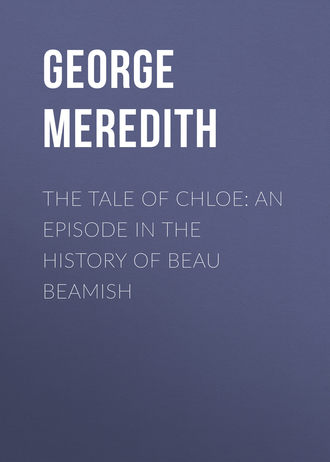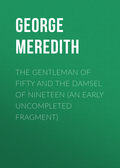
George Meredith
The Tale of Chloe: An Episode in the History of Beau Beamish
Chloe was asleep, at peace by this time, she thought; and how she envied Chloe! She might be as happy, if she pleased. Why not? But what kind of happiness was it? She likened it to that of the corpse underground, and shrank distastefully.
Susan stood at her glass to have a look at the creature about whom there was all this disturbance, and she threw up her arms high for a languid, not unlovely yawn, that closed in blissful shuddering with the sensation of her lover's arms having wormed round her waist and taken her while she was defenceless. For surely they would. She took a jewelled ring, his gift, from her purse, and kissed it, and drew it on and off her finger, leaving it on. Now she might wear it without fear of inquiries and virtuous eyebrows. O heavenly now—if only it were an hour hence; and going behind galloping horses!
The clock was at the terrible moment. She hesitated internally and hastened; once her feet stuck fast, and firmly she said, 'No'; but the clock was her lord. The clock was her lover and her lord; and obeying it, she managed to get into the sitting-room, on the pretext that she merely wished to see through the front window whether daylight was coming.
How well she knew that half-light of the ebb of the wave of darkness.
Strange enough it was to see it showing houses regaining their solidity of the foregone day, instead of still fields, black hedges, familiar shapes of trees. The houses had no wakefulness, they were but seen to stand, and the light was a revelation of emptiness. Susan's heart was cunning to reproach her duke for the difference of the scene she beheld from that of the innocent open-breasted land. Yes, it was dawn in a wicked place that she never should have been allowed to visit. But where was he whom she looked for? There! The cloaked figure of a man was at the corner of the street. It was he. Her heart froze; but her limbs were strung to throw off the house, and reach air, breathe, and (as her thoughts ran) swoon, well-protected. To her senses the house was a house on fire, and crying to her to escape.
Yet she stepped deliberately, to be sure-footed in a dusky room; she touched along the wall and came to the door, where a foot-stool nearly tripped her. Here her touch was at fault, for though she knew she must be close by the door, she was met by an obstruction unlike wood, and the door seemed neither shut nor open. She could not find the handle; something hung over it. Thinking coolly, she fancied the thing must be a gown or dressing-gown; it hung heavily. Her fingers were sensible of the touch of silk; she distinguished a depending bulk, and she felt at it very carefully and mechanically, saying within herself, in her anxiety to pass it without noise, 'If I should awake poor Chloe, of all people!' Her alarm was that the door might creak. Before any other alarm had struck her brain, the hand she felt with was in a palsy, her mouth gaped, her throat thickened, the dust-ball rose in her throat, and the effort to swallow it down and get breath kept her from acute speculation while she felt again, pinched, plucked at the thing, ready to laugh, ready to shriek. Above her head, all on one side, the thing had a round white top. Could it be a hand that her touch had slid across? An arm too! this was an arm! She clutched it, imagining that it clung to her. She pulled it to release herself from it, desperately she pulled, and a lump descended, and a flash of all the torn nerves of her body told her that a dead human body was upon her.
At a quarter to four o'clock of a midsummer morning, as Mr. Beamish relates of his last share in the Tale of Chloe, a woman's voice, in piercing notes of anguish, rang out three shrieks consecutively, which were heard by him at the instant of his quitting his front doorstep, in obedience to the summons of young Mr. Camwell, delivered ten minutes previously, with great urgency, by that gentleman's lacquey. On his reaching the street of the house inhabited by Duchess Susan, he perceived many night-capped heads at windows, and one window of the house in question lifted but vacant. His first impression accused the pair of gentlemen, whom he saw bearing drawn swords in no friendly attitude of an ugly brawl that had probably affrighted her Grace, or her personal attendant, a woman capable of screaming, for he was well assured that it could not have been Chloe, the least likely of her sex to abandon herself to the use of their weapons either in terror or in jeopardy. The antagonists were Mr. Camwell and Count Caseldy. On his approaching them, Mr. Camwell sheathed his sword, saying that his work was done. Caseldy was convulsed with wrath, to such a degree as to make the part of an intermediary perilous. There had been passes between them, and Caseldy cried aloud that he would have his enemy's blood. The night-watch was nowhere. Soon, however, certain shopmen and their apprentices assisted Mr. Beamish to preserve the peace, despite the fury of Caseldy and the provocations—'not easy to withstand,' says the chronicler—offered by him to young Camwell. The latter said to Mr. Beamish: 'I knew I should be no match, so I sent for you,' causing his friend astonishment, inasmuch as he was assured of the youth's natural valour.
Mr. Beamish was about to deliver an allocution of reproof to them in equal shares, being entirely unsuspicious of any other reason for the alarum than this palpable outbreak of a rivalry that he would have inclined to attribute to the charms of Chloe, when the house-door swung wide for them to enter, and the landlady of the house, holding clasped hands at full stretch, implored them to run up to the poor lady: 'Oh, she's dead; she's dead, dead!'
Caseldy rushed past her.
'How, dead! good woman?' Mr. Beamish questioned her most incredulously, half-smiling.
She answered among her moans: 'Dead by the neck; off the door—Oh!'
Young Camwell pressed his forehead, with a call on his Maker's name. As they reached the landing upstairs, Caseldy came out of the sitting-room.
'Which?' said Camwell to the speaking of his face.
'She !' said the other.
'The duchess?' Mr. Beamish exclaimed.
But Camwell walked into the room. He had nothing to ask after that reply.
The figure stretched along the floor was covered with a sheet. The young man fell at his length beside it, and his face was downward.
Mr. Beamish relates: 'To this day, when I write at an interval of fifteen years, I have the tragic ague of that hour in my blood, and I behold the shrouded form of the most admirable of women, whose heart was broken by a faithless man ere she devoted her wreck of life to arrest one weaker than herself on the descent to perdition. Therein it was beneficently granted her to be of the service she prayed to be through her death. She died to save. In a last letter, found upon her pincushion, addressed to me under seal of secrecy toward the parties principally concerned, she anticipates the whole confession of the unhappy duchess. Nay, she prophesies: "The duchess will tell you truly she has had enough of love!" Those actual words were reiterated to me by the poor lady daily until her lord arrived to head the funeral procession, and assist in nursing back the shattered health of his wife to a state that should fit her for travelling. To me, at least, she was constant in repeating, "No more of love!" By her behaviour to her duke, I can judge her to have been sincere. She spoke of feeling Chloe's eyes go through her with every word of hers that she recollected. Nor was the end of Chloe less effective upon the traitor. He was in the procession to her grave. He spoke to none. There is a line of the verse bearing the superscription, "My Reasons for Dying," that shows her to have been apprehensive to secure the safety of Mr. Camwell:
I die because my heart is dead
To warn a soul from sin I die:
I die that blood may not be shed, etc.
She feared he would be somewhere on the road to mar the fugitives, and she knew him, as indeed he knew himself, no match for one trained in the foreign tricks of steel, ready though he was to dispute the traitor's way. She remembers Mr. Camwell's petition for the knotted silken string in her request that it shall be cut from her throat and given to him.'
Mr. Beamish indulges in verses above the grave of Chloe. They are of a character to cool emotion. But when we find a man, who is commonly of the quickest susceptibility to ridicule as well as to what is befitting, careless of exposure, we may reflect on the truthfulness of feeling by which he is drawn to pass his own guard and come forth in his nakedness; something of the poet's tongue may breathe to us through his mortal stammering, even if we have to acknowledge that a quotation would scatter pathos.







